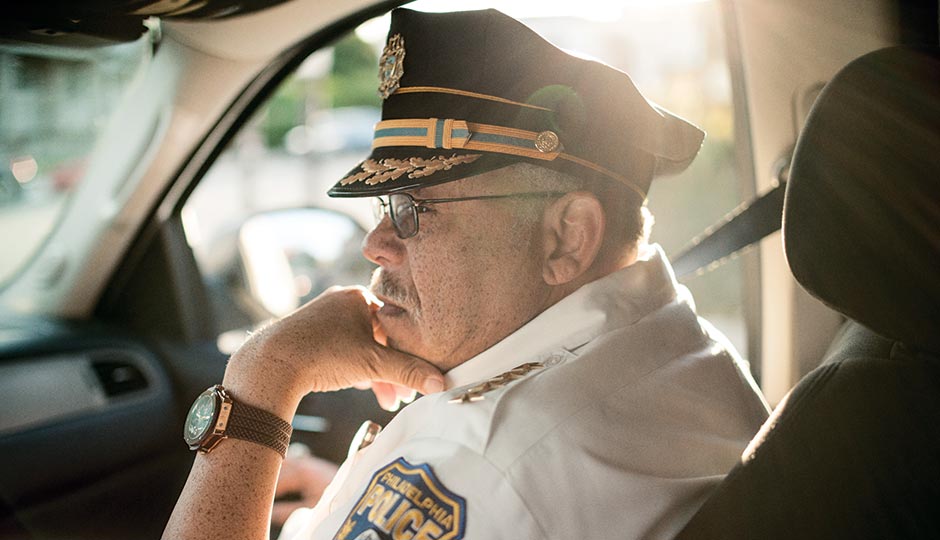Riding With Police Commissioner Charles Ramsey

Photograph by Christopher Leaman
Time: 3 p.m. Day: Monday. Location: PPD Car 1.
A conversation with Police Commissioner Charles Ramsey can take unpredictable turns, like the hard right his driver hangs at high speed onto Hunting Park Avenue as Ramsey’s thumb jams an ear-splitting siren. We’re en route to a double shooting in the city’s Logan neighborhood.
“Well, you got a little bit more than you bargained for,” Ramsey tells me a few frantic blocks later. Behind him, yellow police tape cordons off a crime scene just outside Albert Einstein Medical Center where a 15-year-old girl — a bystander — was shot and killed minutes earlier. “Now you know,” he says, “this shit can turn on a dime.”
Our discussion had begun a few hours earlier in Car 1, the commissioner’s Chevy Tahoe, as it made its way at a leisurely pace to the 22nd police district, west of Temple University.
“Commissioner,” I said, “the police department is plagued by scandals. And yet you remain popular. Why?”
“I could ignore it and pretend as if everything is okay, and create an illusion for the general public that everything is fine,” Ramsey said. “Or I could take a position which I do take, and that is, ‘We know we have issues. Let’s aggressively go after it, and let’s deal with it. And let’s get these people out of our ranks.’ But we gotta send a strong message that that kind of conduct is simply not going to be tolerated.”
“There was intense media scrutiny over the alleged gay bashing in Center City,” I said. “And in the same week, a pregnant mother was shot and killed. That received some attention, but not nearly as much. How do you feel about that?”
“I think it’s a damn shame,” Ramsey said. “We’ve gotten desensitized. It’s like it’s supposed to happen in certain areas. Well, news flash: It’s not supposed to happen anywhere. Where’s the outrage in the city? I mean, people want to march, and want to protest whenever there’s a police shooting or something like that. But where’s the same outrage when you got a pregnant woman shot and killed and her baby dies? That’s not to minimize people getting assaulted, whether it’s in Center City or whether it happened
right here. But I mean, come on.”
Ramsey’s driver stopped Car 1 at 22nd Street and Cecil B. Moore Avenue. The commissioner popped out, wearing his bulletproof vest, then thought better of it. “I got to take this off,” he said. “Can’t have people think you’re afraid in your own city.”
Instantly, grinning passersby surrounded Ramsey. They grabbed his hand, clapped his shoulder, introduced their kids.
“Do you think about running for mayor?” I asked.
“Nah,” he said. “Politics is not my thing. I have too low a tolerance of bullshit. So I’d have a hard time, man. I’d last about two hours. That’s just the truth.”
Ahead, teachers at a playground spotted Ramsey and his uniformed entourage and started scooping up kids to get them inside, worried that something bad was going down.
“You see that?” Ramsey asked. “That’s a shame, right? You shouldn’t have to live like that. You really shouldn’t. Our job is to see to it that people don’t have to react this way. I mean, why can’t you just sit out on your porch and enjoy the day? This is a beautiful frickin’ day. Right?”
“Commissioner,” I said, “when in your career did you stop thinking just about arresting people and more about the right to sit on your stoop?”
“Well, a little later on,” he said. “Because, you know, you think at first it’s just about locking up bad guys, but it’s not. It’s really about making communities safe. We should be trying to starve the criminal justice system, not feed it.”
“When you talk about starving the system,” I asked, “does that include marijuana possession?”
“I’ve got mixed emotions there. We need people in the right state of mind, not in an altered state of mind. And I don’t want it to be perceived that it’s okay now, and we’re somehow endorsing people, you know, getting high. Not having a record’s one thing, but to hold a job is a whole different thing, and you can’t do that if you’re high every day.”
Ramsey reached a little street that his driver called “Old Head Alley,” and the locals — some of them atop surprisingly expensive bicycles — rode over to get a look at the commissioner.
“We never seen a police commissioner around here before. We never seen that,” said the youngest-looking of the old heads. He had a complaint for the commissioner: “These cops come around here, they harass us so bad for a little bit of beer.”
Ramsey listened neutrally for a few minutes and then walked on.
“There’s a way in which you can approach people,” he volunteered as we left. “Treat them respectfully. You don’t want to unnecessarily cause problems. Should they be out there drinking? No. And I’m not condoning it. But you just walk up to them and say, ‘Hey man, we got a complaint and it don’t look good, can you take that inside, or put it in a bag and sit on your porch?’”
“Do your officers approach it that way?”
“A lot of them do. Some don’t,” Ramsey said. “Most departments engage in community policing now. We’ve made inroads, and we pat ourselves on the back about that. But when you look at Ferguson, and you look at some of the more challenged areas in our city, we have yet to really reach the people there to a point where they trust us, where we’ve gained legitimacy in their eyes.”
“If you remain police commissioner after the next mayor is sworn in, what’s next? What’s left undone?”
“Oh, there’s a lot left undone. You ever watch the Olympics? The 4×100-meter relay? Your job is to run as hard as you can and fast as you can, and then smoothly hand off to the next person to run their leg. That’s what being a police chief is all about. You get the baton. You try to make some forward progress with it, and when I hand it off to the next person, hopefully they’re in a little better position than I was in.”
Back at the crime scene — the shooting — the commissioner looks for shell casings. He points to a pink cell-phone case lying on the sidewalk. He talks a bit to the arriving detectives. And then he watches his people work.
“Do you go to a lot of crime scenes?” I ask.
“I don’t go to every scene,” Ramsey says. “But if it’s something like this, involving kids … these are juveniles. I mean, life hadn’t even started.” He pauses, then looks down Broad Street, where the shooter is thought to have fled. “Life turns on a dime.”
On the ride back to the Roundhouse, I ask Ramsey, “How do you cope?”
“It’s never easy. But you learn how to do it. Every now and then you stop and think about a particular case, but I try not dwell on it. I try. It’s just not healthy.”
Car 1 takes the Schuylkill Expressway, and as Ramsey talks, the boathouses whirl by — Sedgeley, Vesper, Malta — and the city’s skyline looms into view, sublimely aglow in the early evening light on this last day of summer. “You got to focus on who did this, and go get the son of a bitch off the street. That’s all you can do.”
After that, there’s silence. Ramsey is too exhausted for more conversation.
Originally published in the November 2014 issue of Philadelphia magazine.
Read more from our Conversation Issue.



